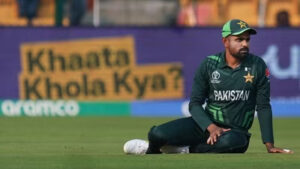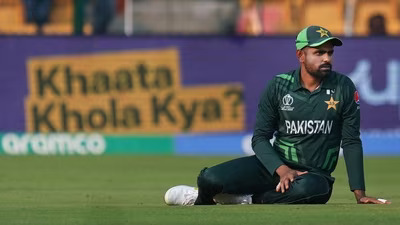
Babar Azam, Pakistan’s embattled captain, had only a few moments to make a decision at the most critical juncture of the ICC Cricket World Cup 2023 match against South Africa in Chennai. He then had a whole night to rue the choice he made. In a contest that resembled a tight battle across a chess board, Babar ended up choosing the wrong piece, letting South Africa stage the Great Escape.
Truth be told, an opportunity had presented itself – of course, Pakistan and, more specifically, Babar had worked towards that – and it needed to be grasped. It would become the most important decision of the night, one that had the most bearing on the outcome.
Pakistan had run out of fast-bowling options, after their trio of fast bowlers claimed seven wickets to push the Proteas’ challenge back time and again. Babar had three bowlers left to pick from. Usama Mir, the leg-spinner who had already claimed two important wickets, Mohammad Nawaz, a steady orthodox left-arm spinner, and the off-spin of Iftikhar Ahmed.
Had Pakistan’s batters lasted the full 50 overs, instead of wasting 20 deliveries, South Africa would have had much more than 271 to chase. But it was pointless at that stage for Babar to dwell on that or how he had gifted Tabraiz Shamsi his wicket after scoring a half-century.
It was also not the time to think of how Pakistan’s attack had to bowl nearly two extra overs because of 10 wides that resulted in 15 extra runs. All that was in the past. As he pondered who to toss the ball to for the 48th over, Babar needed to stay in the present and make a decision that would once again tilt the scales his team’s way.
By and large, he had done a good job of managing the resources at his disposal. But, at the crunch, he faltered when he opted for Nawaz instead of the wrist spin of Mir. Nawaz had rarely threatened a wicket in his six overs, while Mir – though erratic with his lengths – had picked up two key wickets, including Aiden Markram.
Babar picked Nawaz. With disastrous consequences. Shamsi, the No. 11, pinched a run and Keshav Maharaj then pulled a poor delivery behind square on the leg side to spark frenzied celebrations in the South African camp. There’s no guarantee that Mir would have won Pakistan the game, but by ignoring the wicket-taking option in favour of the ‘safe’ one, Babar spurned the chance to find out.
You might argue that this is a case of being wise after the event. But if you dig a little deeper, you’ll see that Nawaz had bowled his six overs by the 20th over. Mir, on the other hand, had bowled the 41st and 43rd overs and conceded just four runs while snaring Markram. With that confidence to back him up, he was surely the better choice to be entrusted with the task of claiming the final wicket.
The two teams had battled hard, unwilling to yield ground to the opposition even while making errors. They had done well to bring the fans to the edges of their seats in anticipation of the first nail-biting finish of the World Cup. And, with three overs left, Pakistan needed just one wicket to complete a remarkable comeback.
There was no time for them to rue the Umpire’s-Call verdict that went in South Africa’s favour after a Haris Rauf delivery thudded into Shamsi’s pad. Pakistan had to accept that and hope that Mohammed Wasim, bowling the final over of pace, would claim his third victim and seal a win.
Strangely, Wasim mostly bowled short and did not attempt to test either the calm Maharaj or an edgy Shamsi with yorkers. It meant that the outcome of the game would hinge on Babar’s final decision. After Maharaj struck the winning four, Babar was seen gesturing dejectedly at Nawaz.
Perhaps, it was his way of recognising that in a game in which hundreds of choices were made, his final decision hurt the team most. And in that one instant, he also revealed his increasing awareness that – with a growing army of critics, not least the insensitive officials back home – his days as the team leader could well be numbered.
It is possible that when he retired to his hotel room in Chennai on Friday night, Babar would have wished that he could turn back the clock. He might also have read the writing on the wall, that doing most things right was not enough against an opposition determined to challenge perceptions about collapsing under pressure.




